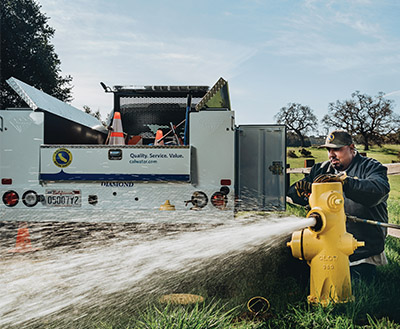Water Quality
What should I do if my coffee has an oily appearance?
Clean your coffee maker with vinegar and water as directed by the manufacturer.
What Causes Taste and Odor Issues?
Odor Issues
The most common cause of odor in hot water is the water heater. If your cold water smells fine, check your water heater to confirm that the temperature setting is correct. Water heaters also need to be maintained (see manufacturer’s instructions). Please contact us if the odor persists or if it is present in both the hot and cold water.
Chlorine Taste or Smell
Cal Water disinfects your water to remove potentially harmful bacteria. To reduce any chlorine taste or smell, try refrigerating your water before drinking.
Seasonal Taste Changes
In some of our service areas, water sources change at certain times of the year due to the availability of supplies. Surface water, or water that comes from sources like rivers and lakes, tends to taste slightly different than water pumped from underground aquifers.
What causes some water to be discolored?
Color in water is usually caused by naturally occurring organic matter, minerals, or mineral build-up in the pipes. At Cal Water, we flush our water system regularly to clean mineral build-up and other sediment from the pipes. If you receive discolored water, you should let your faucets run until the water is clear. Such substances typically do not pose a health hazard; however, we ask that you please report any instances of discolored water to your local Cal Water Customer Center so that we may investigate.
Is bottled water higher quality than tap water?
Tap water providers and bottled water providers must meet the same water quality standards. In fact, tap water providers are required to conduct more frequent water quality testing and reporting than bottled water providers. Some consumers prefer the taste of bottled water, and some choose bottled water because they have special health needs. But tap water is a much better deal, costing 1,000 times less than bottled water.
Why does water need to be disinfected?
Disinfectants are required because they prevent the spread of germs that cause diseases. Years ago, before disinfectants were used for drinking water, diseases such as cholera, typhoid fever, and dysentery were common. Drinking water disinfection has vastly improved the quality and safety of drinking water.
Why is there dirt or sand in my water?
Dirt or sand can occur naturally in groundwater or as a result of a water line repair. We try to reduce the instances of dirt or sand in the water through regular flushing, which improves water quality by increasing the circulation of water in the pipes and removing most of the sediment from the water.
Why does Cal Water sometimes flush water from pipes?

At Cal Water, we conduct periodic flushing as part of our ongoing water quality and water system maintenance program. By opening certain fire hydrants under controlled conditions, we remove minerals and sediment that build up in water lines over time. This improves water quality and increases the amount of water that can flow through the water lines.
Although it may seem wasteful to the casual observer, flushing is actually an important and necessary water utility activity that is endorsed by the American Water Works Association and conducted in accordance with guidelines set by the California Division of Drinking Water.
You will continue to receive water while we are flushing, but the pressure might be lowered temporarily. If you notice any discoloration and/or sediment in your water after we have flushed, please allow water to run from your outside hose bib until it clears.
What causes hard water?
Water is considered soft if total hardness is less than 75 ppm, moderately hard at 75 to 150 ppm, hard at 150 to 300 ppm, and very hard at 300 ppm or higher. To convert the hardness of your water from parts per million to grains per gallon, simply divide by 17.1
Water’s hardness varies with its source. Hard water is not harmful to health, so the choice to buy a water softener is an aesthetic one. However, people on low-sodium diets should be aware that many water softeners increase the sodium content of the water. The hardness of your water is listed in your annual water quality report.

